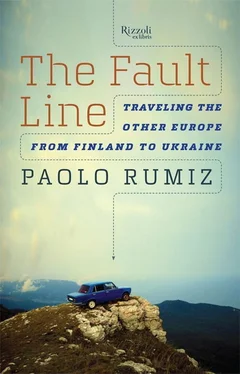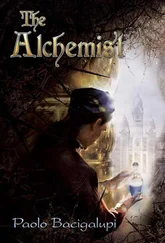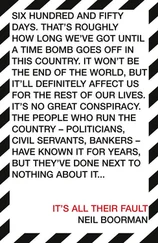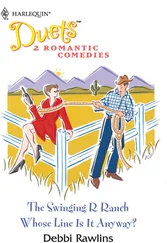I barely have time to get up when the doors open and the women, overloaded with shopping bags, hampered by pants stuffed with new purchases and three-ply overlaid outfits, are off their marks like sprinters, covering in just a few seconds, under the amused eyes of the customs agents, the distance between the platform and the customs office inside the station. Nobody shows any amazement, but I’ve never seen people fly like that except in Chagall paintings. Why the rush? I don’t know. Maybe to be the first to get to the local market with the goods. Maybe to be able to take the next train back to Poland, or to avoid the most annoying checks, which are often saved for those at the end. Or maybe to make it to the black market faster. It all goes by in a flash, and there’s no one left of whom I can ask the question.
We are the last to pass through the checkpoint with our tourist visas. Monika explains that, yes, we are a photographer and a journalist, but we travel with the people. The agent understands immediately: a man on a train with a backpack cannot be a troublemaker.
The dark green current of the Neman meanders on its way in the night, emanating a great sense of calm among the wooded slopes of Grodno, city of churches and synagogues near the Polish border. Neman, a name like a lullaby, the portal of a labyrinth of streams leading to other legendary rivers of Middle Europe: the Bug, the Dniester, the Pripet, the Western Berezina. They spring from no mountain, ice over in the winter, wander through a no-man’s-land of rolling hills, and it seems that it would take only the slightest change in slope to push them to empty themselves into the Baltic instead of the Black Sea.
This frontier is perhaps the most arcane and the least legible of those we’ve encountered so far. The first impact with the only Communist country in Europe is even reassuring: an absolute green that dominates everything, an agrarian landscape dotted with excellently preserved wooden houses, geese running free around the villages. And then this Grodno, Polish until 1939, a shopwindow city of Austrian tidiness, now a beehive of gentrifying restoration, baroque like Vilnius and old Bialystok, full of young people, swallows, and stunning women.
But very quickly it starts to not add up. The old and the new clash without mediation. The Belarus Hotel, where I find a room, is a monument to Brezhnevian grayness, but its rooms are full of horny Sinhalese—in town for a fair—who will be trafficking all night in the hallways trying to find some women for hire. At the bar I see Russian shampanskoye next to five-star Greek Metaxa. A doctor makes €150 a month, but in the restaurants, the prices are higher than in Poland. And then the inflation: at the change office in the station, they give me, in exchange for €100, a wad of bills as thick as my fist. So many and so equally gray that I have to divide them between two pockets. The under-fifty bills in the lower right and the fifty-and-over bills in the upper left. I haven’t seen paper money with that many zeroes since the time of the war in Yugoslavia.
“Welcome to the country of millionaires,” cracks a passerby, watching me fumble with all that paper. On the train to Bialystok, I read that Belarus is broke and that next winter it won’t be able to pay for its Russian gas. But then where does all the money come from for all these restaurants? Who was able to finance this gigantic real estate development operation? I pose this question to two old women sitting in front of the door of a redbrick house. They respond without hesitation: “The gosudarstvo ,” the government. Those people let the old houses fall into ruin, make the inhabitants move out, and then they speculate on the land. And if I ask how they found all that money to build new things, the answer is: “Simple, they don’t pay people who work. Here, life is good only for people who don’t work.” In the station, Alexei, a retired army officer, told me, in no uncertain terms, “They steal. It’s disgusting. And one day they’ll find the red star up their ass.”
In Poland, they told me to be careful, because Belarus is full of police in plainclothes. They may be right, but here nobody is afraid to talk. In an hour, all I hear are merciless critiques of the regime. A former army officer who makes a living driving a taxi tells how he denounced corruption and he was thrown out of the army because of it. “They made me blow up the balloon to demonstrate that I was drunk. But the balloon didn’t change color. So they put me in a mental institution, but General Grizikin had me released for meritorious service. So they discharged me without a pension.” Thin and hyperkinetic, the former Soviet officer shows me the restaurants with violins for the rich and the houses of the poor with old women wrapped in miserable dressing gowns. “A revolution is going to break out,” he sniggers, and he takes me to see three paddy wagons of the militia ready to intervene, hidden in an alley behind the Catholic curia and the church of the Poles.
In a meadow overlooking the river, some young people are sitting on the grass at sunset passing a hookah as the Neman Valley is submersed in the warm colors of the stories of Bruno Schulz. Tanya, red hair enkindled by the sunlight and a star-of-David earring, says that “Grodno isn’t Minsk; it’s a real city, old, with its own history,” and that’s why she loves it. Her friends are also proud of their “city of Europe,” and they say that the West begins here. They point to a nearby synagogue, lit up by the sunset, and on the other side of the river, the Church of Saints Boris and Gleb, almost a thousand years old, all alone, a belvedere amid centuries-old maple trees. Then they show me the Gradnicanka, the palisade of the lovers that slopes down in terraces to a tributary of the Neman. They offer us their hookah, point out to us the lights of the city. “We like Grodno; the Poles call it ‘little Switzerland.’”
Another extraordinary thing: at seven in the evening, the elderly and adult population dissolves into nothingness. On the street, on the benches, in the squares, or along the river walk by the Neman, only young people with potato chips and cans of beer. I don’t know whom to talk to; there’s no one who gives me the impression of being able to talk about the history of the place. In an hour of exploration in the city center, I observe that I am the only adult human in circulation. It’s as though in Grodno, and perhaps in all of Belarus, there had been an extermination of sixty-year-olds, as though yellow fever or the Spanish flu had eliminated the elderly. Alcoholism, rampant in these parts, is not enough to explain this demographic earthquake. There has to be something else. I feel that I am in a country that’s teetering on the edge, vulnerable, divided among orthodox Communism, crude capitalism, and an ingenuous age-old agrarian civilization in danger of extinction. There is supposed to be a bronze statue of Lenin in the heart of Belarus, but here all you can feel is a single superhuman presence: the market.
The next day is Saturday, and we go to the synagogue to see the service. There are only ten survivors of the once numerous community. I feel again the void that I sensed in Latvia and northern Poland, and the Jews are only the most conspicuous absence. Not only have they disappeared, but also the Poles, the Lithuanians, the Germans, the Ukrainians, and the Armenians. A century of pogroms, deportations, and exterminations has created an ethnically simplified Central Europe by destroying its transnational fabric. “Adonai,” “Elohim,” the old people chant in the otherwise empty synagogue, and everything seems to be hanging on the thread of these ancient words, which ensure the continuity of the world. But that is what is really scary. When they are not heard by anyone anymore, then Europe will have definitively lost itself. You realize that already, when the silence returns to the choral space, heavy with nostalgia for a chant that is no longer.
Читать дальше












